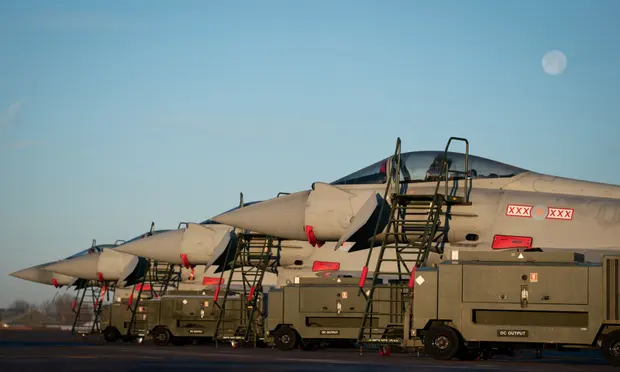Britain will not send Typhoon jets to Ukraine in the short term, the defence secretary has said, despite a campaign by Ukraine’s president, Volodymyr Zelenskiy, and the former prime minister Boris Johnson.
Speaking on the first anniversary of Russia’s invasion on Friday, Ben Wallace said the Typhoons would be too complex for Ukrainian pilots to fly and would involve putting hundreds of British troops on the ground to support them.
The defence secretary’s comments deal a blow to Zelenskiy, who travelled to the UK this month to make a public request for fighter jets. The Ukrainian president has been backed by Johnson, who on Thursday repeated his call for Britain to supply the planes.
Wallace told Sky News on Friday: “We’re not going to send our own Typhoon jets in the short term to Ukraine.”
He added: “Gifting a fighter jet comes with hundreds of people: engineers, pilots, training, electronic warfare. The more complicated the platform, the greater the tail. The west is not going to be putting troops into Ukraine in those scales. The idea that we would put Typhoons in – we would have to send 200 RAF people and we’re not going to do that … at this current stage.”
Wallace said, however, that if other countries with Soviet-origin aircraft wanted to supply Ukraine instead, the UK would be willing to help provide air cover for that country to make up for the loss of jets.
Wallace ruled out sending the Typhoons even as his department continues a review of whether it could send any aircraft to help the Ukrainian war effort. The Ministry of Defence has also begun training Ukrainian pilots on their fighter jets, something British officials say could take years, but Zelenskiy has said could be much shorter.
Despite the decision on Typhoons, the prime minister, Rishi Sunak, will on Friday urge fellow world leaders to move faster in arming Ukraine.
During a virtual meeting to mark the first anniversary, Sunak is expected to say: “Instead of an incremental approach, we need to move faster on artillery, armour, and air defence … Now is the time to support Ukraine’s plan to rearm, regroup, and push forward.”
Meanwhile, James Cleverly, the foreign secretary, has announced an export ban on any equipment Russia is found to have used on the battlefield. The ban will mean companies cannot supply Russia with a range of items, including aircraft parts, radio equipment and electronic components.
The Foreign Office also announced new sanctions on executives at several Russian companies, including the state-owned nuclear power company Rosatom, two defence companies and four banks.



